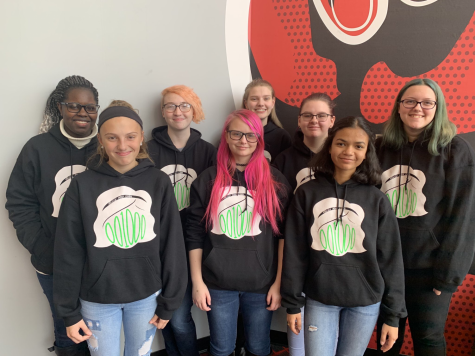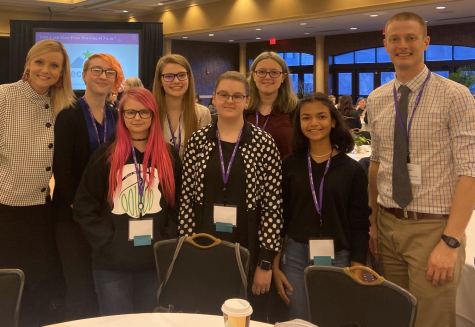Girls Who Code in JCPS
November 10, 2020
The Girls Who Code club at Fern Creek High School allows girls to get a more hands on experience with computer science. Although Fern Creek has a four year computer science program, GWC offers more opportunities to learn outside of the classroom. Girls Who Code (GWC) is a non-profit organization designed to encourage girls to explore STEM classes and careers. It was founded by Reshma Saujani in 2012. By 2019, there were 8,500 clubs operating around the world. GWC has helped around 300,000 girls since it was founded. 50% of those girls come from underrepresented groups in technology. By encouraging girls to pursue careers in STEM, GWC helps bridge the gender disparity gap in STEM fields, allowing girls to access some of the highest-paying jobs.
In 2019, Fern Creek’s GWC competed in the Student Leadership Technology Program. They advanced to the state competition for the website they built using HTML, CSS, and JavaScript. They also attended a Women in Tech conference and me with programmers. The club coordinator, Mr. Tennyson, regularly scheduled online meetings with professional programmers. Last year the girls met with Ingrid Bearer, a M.I.T graduate who worked for NASA.

“With Girls Who Code you don’t have to have any prior interest or be knowledgeable about programming to join.” – Maddie Tatum (Fern Creek HS GWC)
One of the more important aspects of GWC is providing girls with a safe place to learn about coding without feeling like an “imposter” or that they don’t belong. Imposter Syndrome is very common with minority groups. When girls have the opportunity to hang out with other girls who share their same interest in computer science, they’re less likely to experience imposter syndrome.

“I think there is a feeling of intimidation from female students because they know that historically it has been a male-dominated field.” – Jackie Honghern (Teacher, Phoenix HS)
Many JCPS schools have GWC clubs but it takes more than that to keep girls interested in STEM. Having female role models is also important because it shows girls that STEM isn’t just for men. According to a study done by Microsoft, girls who knew a woman in a STEM profession were 61% more likely to feel empowered by STEM, compared to the 44% of girls who didn’t know any women in STEM. A simple solution for this is to have more posters in classrooms and hallways of female role models.
“As a female with 17 years of industry experience, I think the lack of females in the field has been due to their lack of comfort in working with techie men.” – Valerie Ricchio (Teacher, Southern HS)
In addition to role models, girls who received encouragement in STEM classes were significantly less likely to feel embarrassed asking questions in class. They’re less likely to participate in class discussions if they don’t feel comfortable or encouraged to because they’re afraid to ask silly or stupid questions. Girls Who Code solves this because it allows girls to have more real world experiences with STEM and ask questions without fear of being judged.

Emily • Nov 11, 2020 at 8:41 pm
I love u trishy